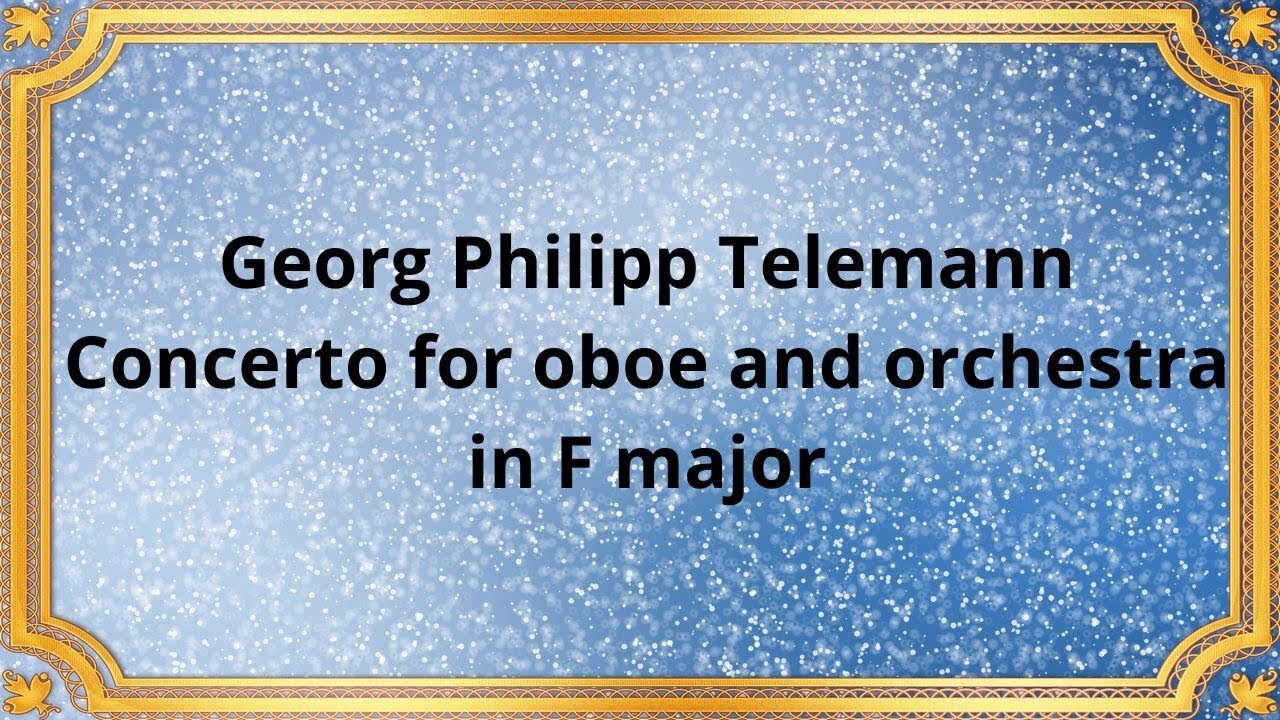Premium Only Content

Georg Philipp Telemann Concerto for oboe and orchestra in F major
#GeorgPhilippTelemann #Concerto #Oboe #Orchestra #FMajor #ClassicalMusic #ChamberMusic #ClassicalComposers #MusicHistory
Helmut Winschermann, oboe
Saarland Chamber Orchestra - Karl Ristenpart, cond.
Georg Philipp Telemann, a prominent composer of the Baroque era, gifted the world with a rich tapestry of musical compositions. Amongst his notable works is the Concerto for oboe and orchestra in F major.
Georg Philipp Telemann composed the Concerto for oboe and orchestra in F major during the early 18th century, a time when the Baroque style reigned supreme. This period witnessed a flourishing of musical expression, and Telemann's compositions played a vital role in shaping the musical landscape of the time. The F major concerto stands as a testament to Telemann's mastery of the concerto form and his ability to create captivating melodies.
The Concerto for oboe and orchestra in F major captivates listeners with its exquisite musical elements. The oboe takes center stage, its expressive and lyrical qualities shining through as it weaves intricate melodies. Telemann's composition showcases the oboe's versatility, ranging from delicate and melancholic passages to bright and virtuosic flourishes. The interplay between the soloist and the orchestra creates a harmonious dialogue, where each section enhances and complements the other.
Telemann's attention to detail is evident in the composition's intricate ornamentation, dynamic contrasts, and graceful phrasing. The orchestra provides a rich and supportive foundation, with strings, woodwinds, and continuo instruments working in harmony to create a vibrant and cohesive musical landscape. The F major concerto showcases Telemann's ability to balance the soloist's virtuosity with the orchestra's accompaniment, resulting in an engaging and harmonious musical experience.
Georg Philipp Telemann's Concerto for oboe and orchestra in F major continues to captivate audiences and leave a lasting impact on the world of classical music. Its enduring popularity can be attributed to its melodic charm, technical brilliance, and Telemann's ability to evoke a range of emotions through his compositions.
The F major concerto has not only influenced subsequent works for the oboe but has also contributed to the development of the concerto genre as a whole. Telemann's innovative use of orchestration and his seamless integration of the soloist with the orchestra set a precedent for future composers. The concerto serves as a testament to Telemann's legacy as a masterful composer and his significant contributions to the Baroque era.
Conclusion:
Georg Philipp Telemann's Concerto for oboe and orchestra in F major stands as a testament to the composer's talent and the enduring allure of classical music. Through its intricate musical elements, emotive qualities, and profound impact on the genre, this composition continues to captivate audiences and remind us of the power of music to transcend time. Telemann's ability to craft melodic beauty and showcase the oboe's expressive capabilities solidifies his place as one of the influential composers of the Baroque era. The F major concerto serves as a timeless reminder of the transformative power of music and its ability to connect us with the emotions and experiences of the past.
You have the opportunity to support the channel:
https://destream.net/live/RadSiarAl/donate
https://www.buymeacoffee.com/6355radsiaral
-
 LIVE
LIVE
Danny Haiphong
2 hours agoMARK SLEBODA & SCOTT RITTER: NATO ATTACKS RUSSIA, PUTIN FIRES ICBM WARNING SHOT AT UKRAINE—WW3 NEXT?
1,866 watching -
 40:47
40:47
Dave Portnoy
5 hours agoThe Unnamed Show With Dave Portnoy, Kirk Minihane, Ryan Whitney - Episode 37
20.5K1 -
 51:53
51:53
The Rubin Report
3 hours agoCrowd Shocked by Ben Affleck’s Unexpected Take on This Massive Change
53K42 -
 2:07:25
2:07:25
Steven Crowder
5 hours agoBREAKING: Russia Launches ICBM for First Time in History - What Happens Next?
378K197 -
 1:39:19
1:39:19
The Shannon Joy Show
6 hours ago🔥🔥While Americans Are Watching WWE Politics: Australia Is Ramping Up MANDATORY Digital ID🔥🔥
20.6K5 -
 2:03:36
2:03:36
LFA TV
16 hours agoTHE FIGHT IN ONLY BEGINNING! | LIVE FROM AMERICA 11.21.24 11am EST
46.7K25 -
 1:18:10
1:18:10
Graham Allen
6 hours agoPutin Vows Peace With Trump But WAR Under Biden!! + 400,000 Kids Are MISSING?!
116K227 -
 2:11:07
2:11:07
Matt Kohrs
14 hours agoMSTR Squeezes Higher, Bitcoin To $100k & Nvidia Post Earnings || The MK Show
56.9K1 -
 42:07
42:07
BonginoReport
8 hours agoNikki Haley's Hatred of Tulsi Gabbard Just Made Me a Bigger Fan (Ep.90) - 11/21/24
114K232 -
 28:41
28:41
Professor Nez
13 hours ago🚨BLOOD on their HANDS! The Man Biden & Kamala Flew In Finally Faces JUSTICE for Laken Riley
58K30